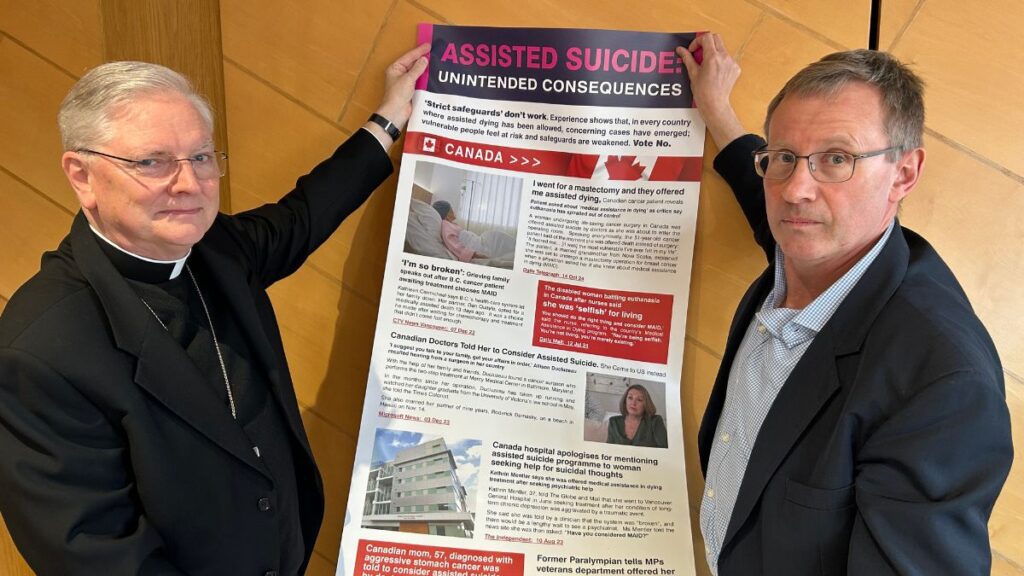Assisted Suicide vote: 'Do not give up hope'
Archbishop Cushley has urged Catholics not to lose hope and to continue praying and working to reject assisted suicide.
On Friday, MPs narrowly voted in favour of introducing assisted suicide in England & Wales, supporting the Terminally Ill Adults (End of Life) Bill by 314-291 votes. Find out how Scottish MPs voted here.
The Archbishop made his comments at St Patrick's Church in Kilsyth on Sunday which hosted the annual Archdicoesan Corpus Christi procession.
He said: "People talk about choice, compassion and dignity - but I fear that all three risk being lost in what we are seeing happening in our country.
I will continue to speak about it and point out in all charity the mistakes and the flaws that are contained in these decisions
"As Catholic Christians we have a consistent principled position that has not changed and that cannot change; life is a gift that we receive and that we pass on to others, it is a gift from God.
"Even if you don’t believe in God, life is something given to us that we cannot take, we can only give back, we can only nurture and we can only love.
"I will continue to speak about it and point out in all charity the mistakes and the flaws that are contained in these decisions, even if they are well intentioned and well meaning."
He echoed the message of Bishop John Keenan, President of the Bishops' Conference of Scotland who assured the poor and vulnerable that the Church will never abandon them, writes the Catholic Parliamentary Office.
He said: “I make this promise to all people: the Catholic Church will continue to offer her unwavering commitment to the poorest and most vulnerable. We will never abandon you.”
Assisted Suicide Vote – Bishop John Keenan tells the poor and vulnerable: ‘we will never abandon you’ https://t.co/wIaXBqXUBz pic.twitter.com/poQjyEBvrY
— RC Politics (@rcpoliticsuk) June 22, 2025
He added: "Despite the deeply held and clearly expressed concerns of some of the most vulnerable people in our society, including the disabled, MPs have decided to progress this Bill and move one step closer to the establishment of state facilitated suicide.
“There is no dignity in handing a lethal concoction of drugs to a vulnerable person to help them kill themselves.”
UK Parliament votes to legalise assisted suicide – find out how Scotland’s MP’s voted https://t.co/dYAmlKWChV pic.twitter.com/OKBmLDtJt5
— RC Politics (@rcpoliticsuk) June 22, 2025
“Despite yesterday’s result, we still hold out hope that sense will prevail and this Bill will not pass into law.
Paul Atkin, Pro-Life Officer for the Archdiocese said: "We will continue to advocate for a culture of life, promoting palliative care and ensuring that all individuals receive the love, respect, and assistance they deserve, especially during their most vulnerable moments.
"Our efforts will also include greater education and resources for Catholics and all people of good will on the Church's teaching against euthanasia and assisted suicide."
The Bill will now pass to the House of Lords for further scrutiny.
The dangerous Bill, which has been criticised by medical bodies, including the Royal College of Psychiatrists and the Royal College of Physicians, has also been strongly opposed by organisations representing vulnerable people across the UK, including the disabled, the elderly, those with eating disorders and victims of domestic abuse, who fear that people will be coerced into an early death.
Whilst the law would not apply to Scotland, it is likely to influence similar legislation currently being considered by the Scottish Parliament and which is expected to be considered by MSPs later in the year.
Keep up to date on this issue by visiting the website of the Catholic Parliamentary Office.
